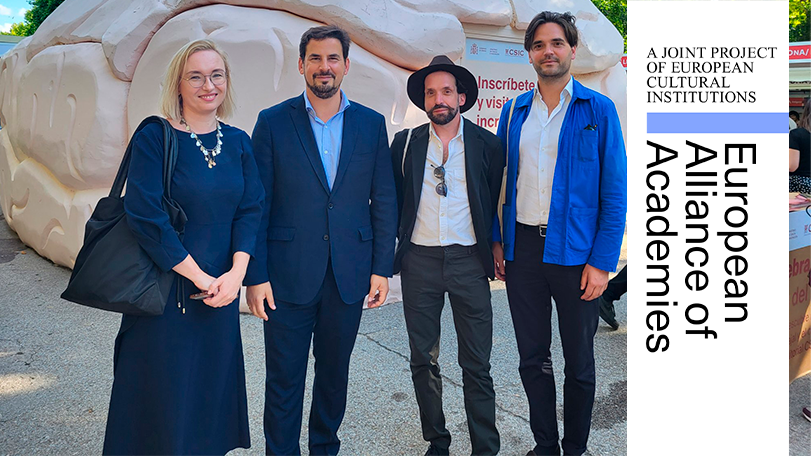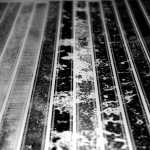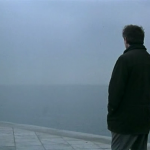Bilingual version (Spanish and English)
• La European Alliance of Academies alerta sobre la creciente amenaza a la libertad artística que se observa en algunos países europeos.
•El debate, en el que participaron cuatro miembros de la Alianza, se celebró en el marco de la Feria del Libro de Madrid.
“Libertad de creación artística en Europa” es el título de la mesa redonda celebrada en la 82ª edición de la Feria del Libro de Madrid. En el diálogo, organizado por el Círculo de Bellas Artes (Casa Europa) y la European Alliance of Academies se analizó la situación actual en aquellos países en los que la libertad creativa de artistas, músicos o escritores ha sido coartada, profundizando en los casos de Hungría y Polonia, donde estos derechos están especialmente amenazados. Durante el debate se llamó también la atención sobre otras amenazas (algo más invisibles, pero también peligrosas), que afectan ya a numerosos países europeos: aquellas que se sustentan en mecanismos políticos, que si bien están legitimados democráticamente, facilitan numerosas restricciones a la libertad artística. “La mirada de España está fuertemente orientada hacia varios tipos de censura en Latinoamérica, pero también en Europa tenemos diferentes ejemplos que deben hacernos estar en guardia”, señaló Valerio Rocco, director del Círculo, para quien “incluso los derechos que parecen más consolidados están en constante riesgo, por lo que es preciso seguir luchando por ellos cada día”.
Ante la necesidad de combatir estos peligros, en 2020 se creó la European Alliance of Academies (de la que el Círculo es miembro, en su calidad de Casa Europa), una red transnacional que aglutina a 70 instituciones culturales de toda Europa. Su propósito es preservar y promover la libertad de expresión artística en nuestro continente, así como impulsar una mayor inclusión de las artes y la cultura en las agendas políticas europeas. “El objetivo -destacó Rocco- es tener una voz unida contra los ataques a la libertad artística y de creación, para lo que es fundamental asumir una perspectiva transnacional sobre la cultura”.
Dominika Kasprowicz (directora de la Villa Decius de Cracovia) y Ferenc Czinki (director de la Asociación Húngara de Escritores) detallaron durante sus intervenciones cómo se vive en sus países la limitación a la creación artística que imponen sus respectivos gobiernos, alertando sobre el avance lento pero implacable de medidas impensables hace sólo unos años. “La situación que vivimos actualmente no se produce de un día para otro. La forma en que los recortes de derechos y libertades se extienden paulatina, gradualmente en la sociedad, lo convierten en un verdadero peligro que muchos tardan en identificar, hasta que la situación se vuelve difícilmente reversible”, ha avisado Czinki.
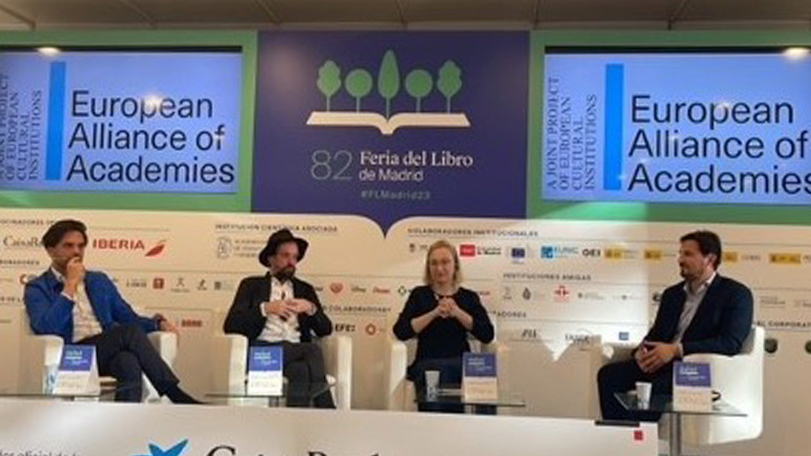
El debate ha contado también con la participación del director de la Real Academia Holandesa de Artes y Ciencias, Geertjan De Vugt, que destacó otro tipo de censura; aquella que se observa en países como Holanda o España, donde libertades fundamentales como la de expresión o creación, no se ven amenazadas a priori. “En muchas ocasiones, es el mismo público quien coarta la libertad artística, ejerciendo un tipo de violencia que repercute en una especie de autocensura. Esto lleva a algunas instituciones a extremar el cuidado a la hora de programar, para no herir susceptibilidades”, ha comentado.
El coloquio celebrado en el Feria del Libro de Madrid, sirvió de continuidad a la actividad desarrollada el pasado mes de mayo por la European Alliance of Academies en Budapest, con el objetivo de enviar una señal por la libertad artística en solidaridad con la Sociedad de Autores Húngaros Szépírók Társasága. Los debates se centraron en analizar la libertad cada vez más restringida del arte y las plataformas artísticas en Hungría (llamando la atención sobre la falta de financiación, producción y distribución de obras artísticas alternativas), algo que se observa también en otros países europeos. Jeanine Meerapfel (presidenta de la Academia de Artes de Berlín) subrayó entonces que “la Alianza continuará presionando al Parlamento Europeo para insistir en que el Gobierno Húngaro apoye a las asociaciones de artistas independientes”. La Alianza mantiene así su llamamiento a los poderes políticos europeos, exigiendo medidas que protejan y defiendan el derecho a la libertad artística y la autonomía de las instituciones, de conformidad con el artículo 13 de la Carta de los Derechos Fundamentales de la UE. “Sólo juntos lograremos mantener y defender este espacio libre para el futuro”, reza en su manifiesto fundacional.
• The European Alliance of Academies warns about the growing threat to artistic freedom in some European countries.
• The debate, in which four Alliance members took part, was held in the framework of the Madrid Book Fair.
“Freedom of artistic creation in Europe” is the title of the round table held at the 82nd edition of the Madrid Book Fair. The dialogue, organised by the Círculo de Bellas Artes (Casa Europa) and the European Alliance of Academies, analysed the current situation in those countries where the creative freedom of artists, musicians and writers has been curtailed, examining in depth the cases of Hungary and Poland, where these rights are particularly threatened. During the debate, attention was also drawn to other threats (somewhat more invisible, but also dangerous), which already affect many European countries: those based on political mechanisms, which, although democratically legitimised, facilitate numerous restrictions on artistic freedom. “Spain’s gaze is strongly oriented towards various types of censorship in Latin America, but in Europe we also have different examples that should make us be on our guard”, said Valerio Rocco, director of the Círculo, for whom “even the rights that seem more consolidated are at constant risk, so it is necessary to continue fighting for them every day”.
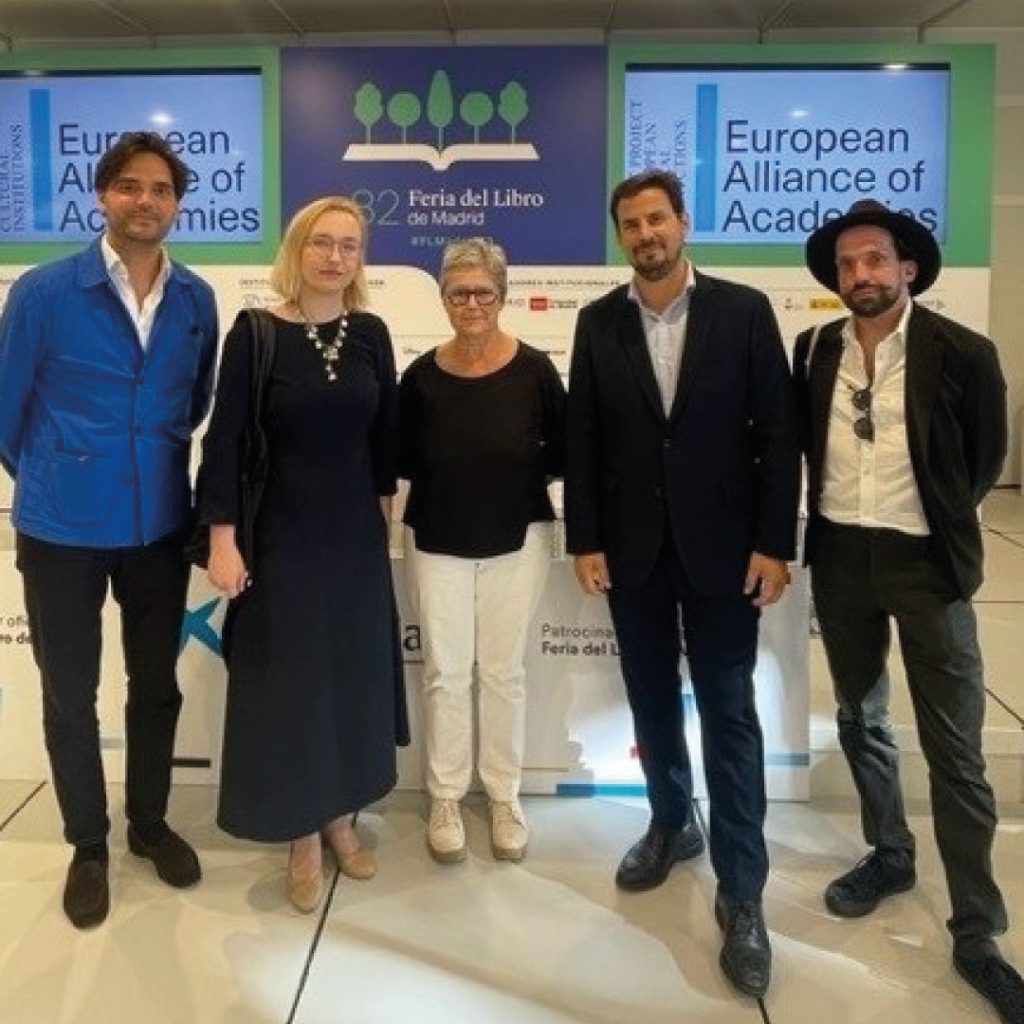
Faced with the need to combat these dangers, the European Alliance of Academies (of which the Círculo is a member, as Casa Europa), a transnational network that brings together 70 cultural institutions from all over Europe, was created in 2020. Its purpose is to preserve and promote freedom of artistic expression on our continent, as well as to encourage greater inclusion of the arts and culture in European political agendas. “The aim is to have a united voice against attacks against artistic freedom and freedom of creation, for which it is essential to adopt a transnational perspective on culture,” said Rocco.
Dominika Kasprowicz (director of the Villa Decius in Krakow) and Ferenc Czinki (director of the Hungarian Writers’ Association) detailed during their speeches how they experience in their countries the limitations on artistic creation imposed by their respective governments, warning of the slow but implacable advance of measures that were unthinkable only a few years ago. “The situation we are currently experiencing does not happen from one day to the next. The way in which the curtailment of rights and freedoms is gradually spreading in our societies makes it a real danger that many are slow to identify, until the situation becomes difficult to reverse”, Czinki warned.
In debate participated also the director of the Royal Netherlands Academy of Arts and Sciences, Geertjan De Vugt, who highlighted another type of censorship; that which happens in countries such as Holland or Spain, where fundamental rights such as freedom of expression or creation are not threatened, at least a priori. “In many cases, it is the public itself that restricts artistic freedom, exercising a type of violence that leads to a kind of self-censorship. This makes some institutions extremely careful when it comes to programming, so as not to offend susceptibilities”, he commented.
The colloquium held at the Madrid Book Fair was a continuation of the activity developed last May by the European Alliance of Academies in Budapest, with the aim of sending a signal for artistic freedom in solidarity with the Hungarian Authors’ Society Szépírók Társasasága. Discussions focused on analysing the increasingly restricted freedom of art and art platforms in Hungary (drawing attention to the lack of funding, production and distribution of alternative artistic works), which is also observed in other European countries. Jeanine Meerapfel (president of the Berlin Academy of Arts) stressed at the time that “the Alliance will continue to put pressure on the European Parliament regarding the Hungarian governmental support to independent artists’ associations”. The Alliance thus maintains its appeal to the European political powers, demanding measures to protect and defend the right to artistic freedom and the autonomy of institutions, in accordance with Article 13 of the EU Charter of Fundamental Rights. “Only together will we succeed in maintaining and defending this free space for the future,” according to the Alliance’s founding manifesto.

